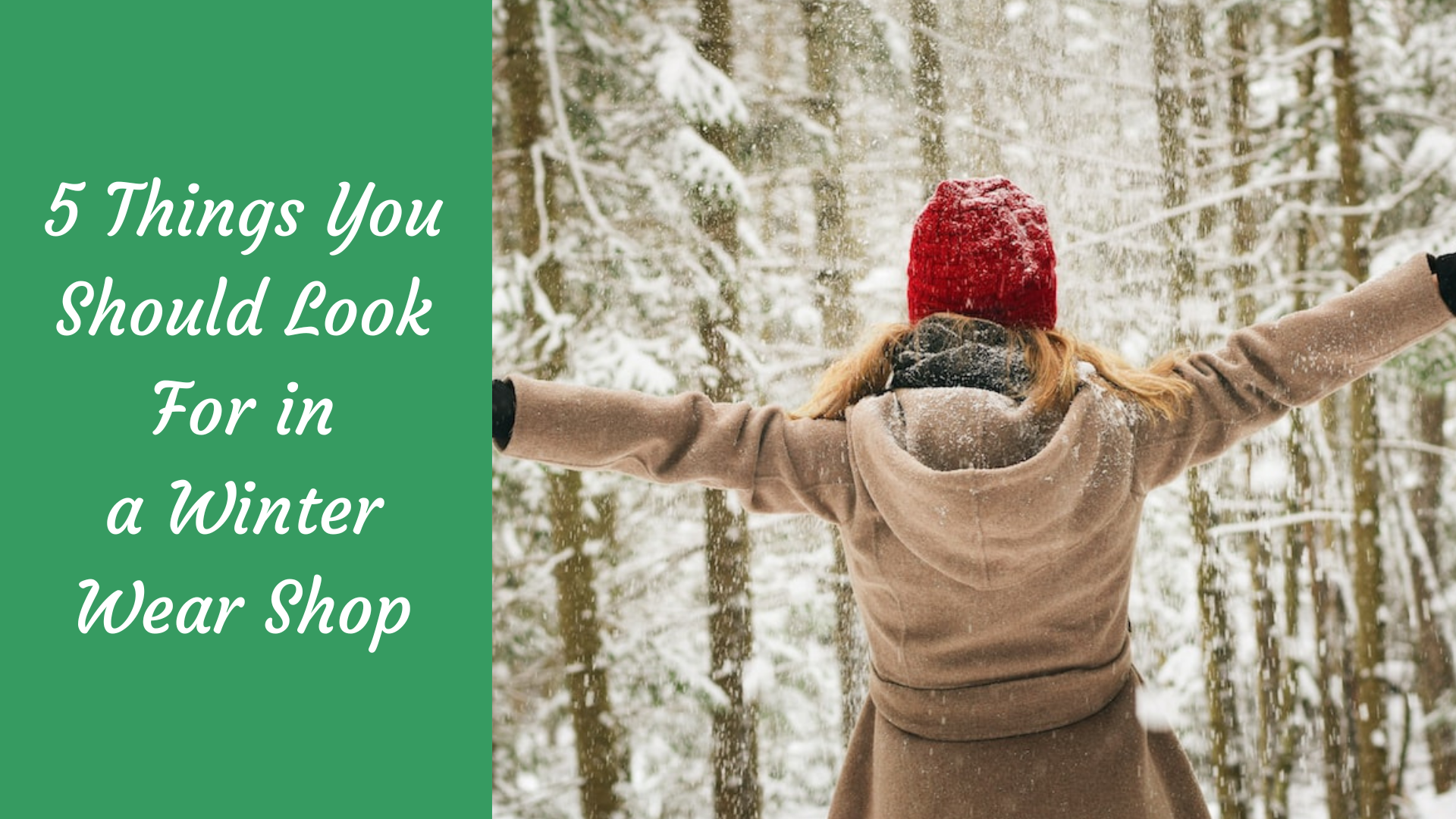
Table of Contents
5 Things You Should Look For in a Winter Wear Shop
Winter is an essential season for appropriate clothing. So you should be ready with your gear beforehand. And for that, you need to visit a winter wear shop.
Peak winters will see fluctuating temperatures. There’s a lot you can do in winter. But you must have the right clothes on your body too. You will need different types of clothing for varying temperatures.
I’ll take you through the essentials you can buy at a winter wear shop. You’ll learn what to wear for different activities.
Shop for a 3 Plus 1 Layering System at a Winter Wear Shop
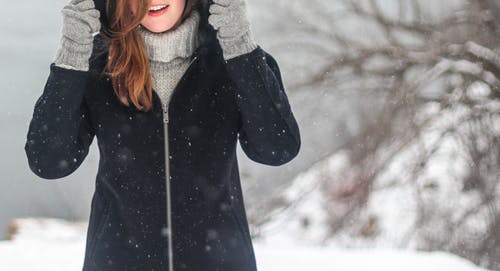
Peak winter weather is all about a 3-plus-1 layering system. You have a base, middle and outer layer. Apart from this, you should add essential accessories. So here’s a brief look at the layering system:
- A base layer should wick away moisture from the sweat on your skin.
- A middle layer should provide good insulation and give you a cozy feel.
- An outer layer defends you from the harsh winter elements. It should be able to keep you warm and dry as well.
- Accessorize your outfit to fill the gaps. Your layers will cover your body’s top and bottom. But accessories will help to protect your ears, head or neck, which might remain uncovered.
Base Layer
Start off with a moisture-wicking base layer next to your skin when you layer your winter wear. It could be a t-shirt and leggings. Look out for tights, tees and tops made with a breathable fabric.
Base layers are often made with wool, polyester or fleece. These fabrics are perfect for providing warmth in comfy fits.
Middle Layer
After your base layer comes to a cozy middle layer, this layer will keep the heat close to your body. It can be a sweatshirt, a zip-up hoodie, or a vest.
For this layer, you can also wear a sweater or a thick button-down top. A mid-layer is also handy if the sun peeks out and you need to shed your outer jacket.
Outer Layer
This layer is the one that’s outermost to your winter clothes. It’s the first line of defence against the biting cold. Here’s where you need to shop winter jackets for your safety.
Pick a jacket that suits the weather you’re in, and don’t forget about the pants. For snowboarders and trekkers, waterproof insulated pants will protect your legs.
You can choose to wear them on their own or over winter tights for good insulation. If you want to wear jeans or chinos, please layer thin tights underneath. It provides warmth without having to sacrifice aesthetics.
Accessories
Accessories are as essential as the other layers of your winter clothing.
You have options such as scarves, hats, gloves, and socks. All these items play a massive role in sealing the warmth and completing your outfit.
You can also store some small accessories in your jacket’s pockets. The warmth will benefit your head, neck, ears, arms, and feet. Ensure that you opt for fabrics that won’t dampen when exposed to wet conditions.
Shop for Varying Temperatures in a Winter Wear Shop
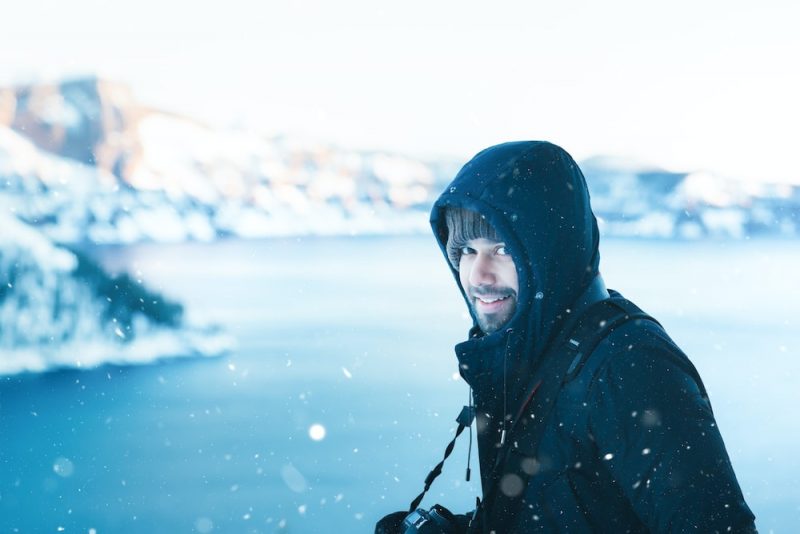
When you’re planning your winter travels, the temperature is a consideration. Different temperatures demand other winter wear.
It can get tough to choose what works for the climate you’re getting into. But here’s a guide on what you need to shop. The temperatures below range from 10°C to below -0 °C
10 to 15°C Degrees
These temperatures are milder during peak winter times. You will feel a little cold if you’re not used to it, though. Hence you must shop for suitable winter wear at a winter wear shop.
At 10°C, you can wear a parka or a leather jacket. You can also consider your favourite shirt and jeans or dress combo. But you must layer this outfit. So you need to shop winter outerwear.
Here are some options for you to Pack:
For your tops, pick long-sleeved shirts, hoodies and dresses
As your lightweight outerwear, leather jackets, parkas, and pea coats should be fine.
For the bottoms, shop for jeans, trousers, or long skirts.
Shop for sneakers, boots, and a scarf at a winter wear shop for footwear and accessories.
0°C to 5°C Degrees
Once the temperatures drop into single digits, forget lightweight tops. You should pack thicker sweaters, to stay warm under your coat.
Choosing the correct fabrics is also as crucial as the layer. And you should also shop for thermal underwear at a winter wear shop for extra warmth.
Replace your parkas and leather jackets with a puffer jacket. You can also go for a wrap-style overcoat in these temperatures.
Chunky snoods, infinity scarves and woollen beanies keep your face and ears warm. You should also pack a few touch-screen gloves for your hands. You can also dip your hands into your coat’s deep pockets.
Shop for a few padded or puffer jackets for your winter travels in these conditions. You can carry along trench Coats, and fur or faux fur Coats.
Sweaters would be the ideal tops for these temperatures
And for your bottoms, pick jeans and trousers from a winter wear shop.
You’ll also need thermal underwear such as long-sleeved thermal tops and thermal leggings. And as accessories, you have a few options. You can wear beanies, berets, touchscreen gloves, scarves, socks, and boots
You should pick an oversized coat to avoid wearing plenty of layers underneath. If it tends to rain, opt for a waterproof jacket. This way, you won’t have to pack an extra rain jacket.
Below -0°C
You should beware if the temperature reaches a freezing point. In such situations, look for heavy-duty double-layered and hooded down jackets. You should also wear a beanie, earmuffs and a scarf.
Choosing suitable fabrics for both your inner and outerwear is of utmost importance. In sub-zero conditions, fleece lining, down, wool, and polyester blends should work well.
But in such weather, ensure that your outerwear is waterproof. Your jacket, bottoms, gloves, and shoes should contain this feature.
Wet clothes are a no-no in cold weather. Once your clothing gets wet, it must dry up fast. Or else you will regret your choice for the rest of the outing.
Damp clothing will also lead to health concerns over time.
Here’s a gist of the things you can shop:
Outerwear: Double-layered hooded down jackets (Waterproof options would be preferable)
Here again sweaters would be a must as tops. It would work as a mid layer to your coats.
You can pair it with waterproof leggings or thermal underwear.
For your accessories, beanies, ear muffs, scarves and thick socks are ideal. Carry a few pairs if need be for your socks.
Your winter boots should be waterproof with a good grip and insulated lining.
Buying Sportswear at a Winter Wear Shop: Things to Consider
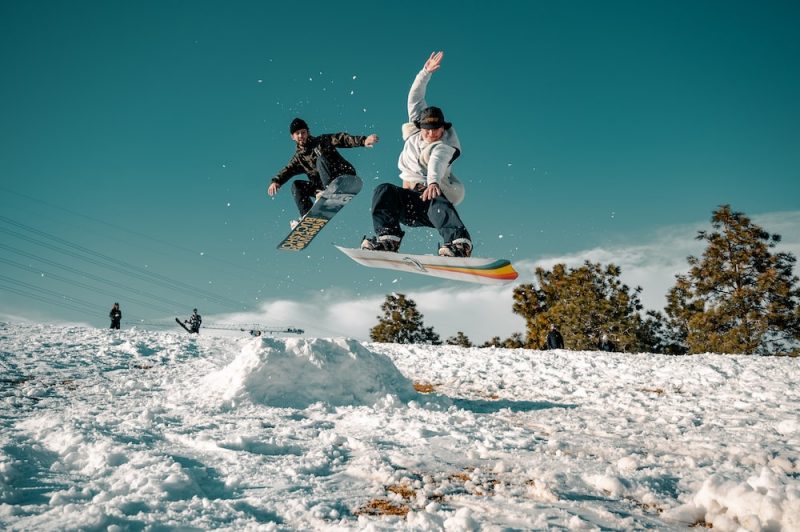
Winter sports are another exciting feature of the winter season. You get to enjoy yourself while indulging in some fun activities. Here again, you must shop winter clothing that suits the sport.
When you shop winter wear, think about the following aspects before making your picks:
- The sport
- The climate
- The terrain
- The needed level of protection
Let’s look at these four aspects in detail further. It will help you when you’re out to shop for the ideal winter wear.
The Sport
It all begins from here. The sport you play will determine the gear you need. So, when you shop for winter clothing, it will vary from sport to sport.
You won’t wear the same clothes for running, skiing, swimming or snowboarding. For example, skiing requires specific winter gear for the best experience. You’ll need ski jackets and pants while you’re up in the mountains.
This gear includes snow-specific features that keep you warm during your activity. It also prevents the snow from penetrating your body.
Other winter sports might not take place in the snow. Swimming is one such sport. So you’ll still need to shop for the sport’s winter wear.
When winter swimming, use insulated swimsuits to make your activity enjoyable and safer.
The Climate
The climate has a role to play here as well. When you shop winter sportswear, assess the intensity of the cold weather.
How cold is it going to be at the location of your sport? Is there a lot of snow?
Does it tend to rain often? You should find answers to these essential questions. You’ll be better off while you pick your winter clothing.
It’s vital to make the most of your sporting experience. For example, check if the climate is windy and rainy during winter. You should invest in a waterproof and windproof outer layer in such cases.
Lightweight layers will do a good job when the weather ranges from cold to warm. You won’t need an insulated outer layer as the day progresses.
The Terrain
Rugged outdoor sports in harsh mountain areas include backcountry skiing or mountain hiking. These sports need different winter clothes compared to their counterparts.
Heavy-duty winter boots and moisture-wicking socks are essential on rough terrains. Avoid shopping for a pair of sneakers for rugged outdoor winter sports.
Level of Protection
Are you taking part in a high-impact or low-impact winter sport? You must be aware of this aspect. It helps you determine your options while you shop winter wear.
Let’s take high-impact sports as an example. High-impact winter sports include skiing, snowboarding, sledding, and ice skating. These are the sports where injuries are pretty common. Along with that, you also encounter snow and ice on your winter expeditions,
Hence, high-impact winter sports need better protective gear than low-impact winter sports.
Protective clothing with extra padding and support is valuable for high-impact winter sports. It can help prevent injuries.
Options for a Cold-Weather Workoutat a Winter Wear Shop
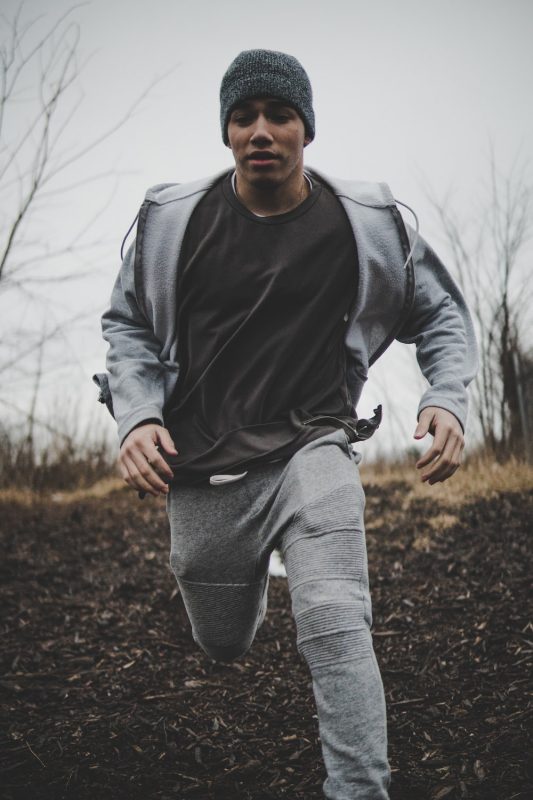
You shouldn’t give up on your workout sessions when winter is around. Winter encourages you to stay fit and healthy even in the coldest temperatures. And you have some useful clothing items to wear while you gain some muscles.
So let’s check out a few of the options you can consider. They’ll be useful when you shop for a gym session for winter wear.
Leggings
Prepare yourself with thicker fabrics to shield your legs from the cold. Lightweight, airy leggings are ideal for temperature drops. Wool-blends or fleece-lined leggings and tights are good to keep your lower-body warm.
Long-Sleeve Layers
Long-sleeve tops work well for your cold-weather workouts. It could be a base, mid-layer, or solo top.
Seamless designs with moisture-wicking fabrics keep you dry and warm in chillier temperatures.
These tops are perfect for dealing with sweaty workout sessions in the gym. For more insulation, wear a turtleneck, especially if you don’t want extra layers.
Weatherproof Jackets
A few winter athletes can manage with a single long-sleeve top in the cold. But if you like layering, a lightweight, insulated jacket or windproof design works. You can wear this over a long-sleeve base or mid-layer.
Puffer Vests
Wear a puffer vest to free up your arms while exercising. An insulated vest is less cumbersome layer to wear over a long-sleeve top. You can also layer it over a zip-up jacket, or moisture-wicking turtleneck.
Sweatshirts
Sweatshirts are another easy-to-wear option for your winter collection. You can wear this to your gym sessions as well.
It works well in winter. You can wear it for a trail walk, run, or gym session.
Joggers
Like sweatshirts, joggers are also ideal for winter workouts. For high-intensity activities, a slimmer-fit jogger will be fine. This piece of legwear can work as a warm-up layer in cold weather. It could be cotton, fleece-lined, or water-resistant design.
Winter Sneakers
A winter-ready sneaker works for your cols-weather workouts too. But ensure that your feet are well-covered. Look for an insulated, waterproof design that suits a trail or street.
Hats, Gloves, and Extras
Accessories work wonders during your exercise sessions too. It puts your cold-weather workout outfit together. Hats, headbands, gloves and neck warmers are ideal for your workout sessions.
But don’t forget to add tall socks to the list too. It helps you raise your performance levels.
Conclusion
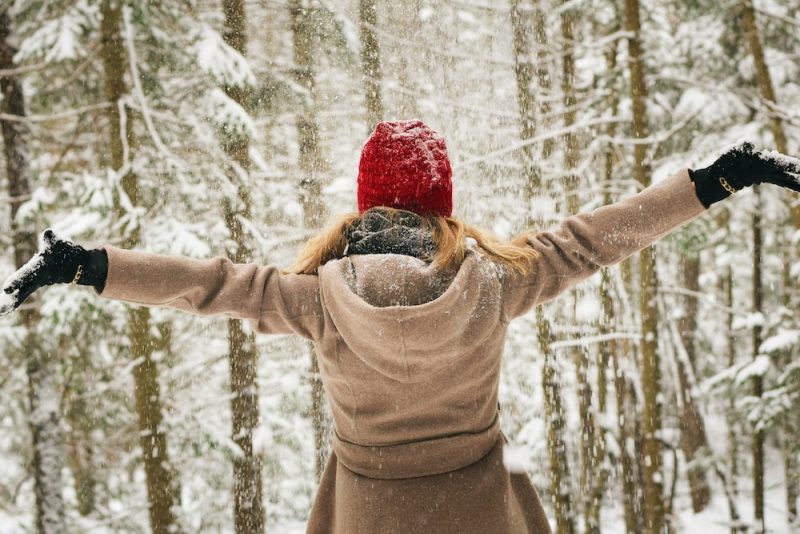
Winter clothing is available for various occasions and events. All you need to do is pick the items according to your needs. Make the most of cold-weather activities by shopping for suitable clothing.
This guide took you through varying temperatures, sportswear tips, and workout clothing options. So how are you planning to add to your winter collection this season?
Whatever you choose to wear, I hope it works for winter and helps you enjoy the weather. So when are you planning to visit a winter wear shop this season?
This post was written by Kosha team member – Shawn Mathias